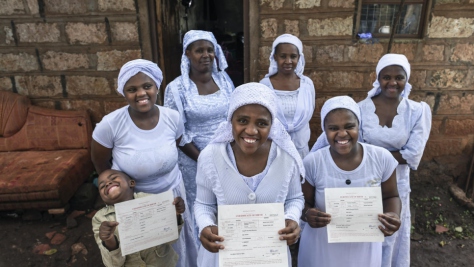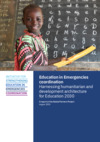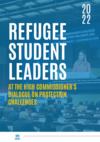UNHCR seeks $13 million to step up response to South-East Asia boat crisis
This is a summary of what was said by UNHCR spokesperson Melissa Fleming – to whom quoted text may be attributed – at today's press briefing at the Palais des Nations in Geneva.
UNHCR is seeking US$13 million to help with the needs of new boat arrivals in South-East Asia, where thousands of refugees and migrants have been crossing the Bay of Bengal and the Andaman Sea.
The appeal was launched yesterday, and is aimed at beefing up our work to do with protection for the nearly 4,800 people from Myanmar and Bangladesh who have been disembarked from smugglers' boats in the last month. In the latest incident, earlier this week, over 700 people were landed in Myanmar's Rakhine state. They included some 120 women and children who said they had been at sea for at least three months.
With the monsoon season imminent, it's estimated that thousands of people may still be at sea.
UNHCR's appeal follows from last Friday's regional meeting of affected States held in Bangkok. It also reflects elements of a 10-point plan of action proposed by UNHCR, the International Organization for Migration and the UN Office on Drugs and Crime.
The funds will allow UNHCR to step up its response in three main areas: Firstly by helping meet the international protection needs of new boat arrivals, secondly by enhancing information available to people considering the journey, and thirdly by targeting some of the root causes of these movements in source countries.
To date, UNHCR's teams have registered just over 1,000 Rohingya new arrivals in Indonesia. In southern Thailand we have distributed relief supplies and are counselling dozens of new arrivals, while in Malaysia we are scaling up to meet the needs of arrivals once consistent access is provided.
Additional resources are needed to set up mobile multi-functional teams to quickly identify and help people with specific protection needs. Refugees who cannot return home will need assurance that they can stay in host countries temporarily with access to legal work until conditions are conducive for voluntary return or until other solutions are found. Where possible, UNHCR will support livelihood programs within national structures to serve the needs of both refugees and host communities.
The appeal envisages trainings for the region's search-and-rescue officials on international legal principles and protection, and exploration of predictable disembarkation options. UNHCR will also expand its monitoring and reporting on maritime movements to include information campaigns providing factual information to potential travelers about the risks and mistreatment at the hands of smugglers and traffickers.
To reduce incentives for people to undertake these dangerous sea journeys, UNHCR will seek legal alternatives such as programs to transition from refugee to migrant status in host countries in need of temporary migrants.
A key part of the appeal focuses on mobilizing support for humanitarian, human rights and development needs in source countries to address the root causes of movement. UNHCR is ready to work with the governments to address issues of citizenship and documentation of people in Bangladesh and in Myanmar's Rakhine state.
To help resolve the three-year-long internal displacement in Rakhine state, UNHCR is seeking to expand assistance to and monitoring of displaced families who wish to return home or establish new homes.
For more information on this topic, please contact:
- In Bangkok, Vivian Tan on mobile +66 818 270 280
- In Geneva, Babar Baloch on mobile +41 79 557 9106
-

'I want all Shona women to see that they can be anything they want'
11 Nov 2020 Over 18,000 stateless people in Kenya struggle to access basic services as they lack official identity documents. A young woman has made history as the first stateless Shona woman to make it to university. -

UNHCR urges states to end limbo for stateless people by 2024
11 Nov 2020 UNHCR's #IBelong Campaign, to end statelessness by 2024, Filippo Grandi calls for protection of stateless populations as COVID-19 is worsening the plight of millions of stateless people worldwide. -

Education in Emergencies coordination - Harnessing humanitarian and development architecture for Education 2030 (PDF)
10 Nov 2020 This report presents learning and recommendations from UNHCR, the Global Education Cluster and INEE on strengthening education in emergencies (EiE) coordination -

UNHCR expands aid as Ivorian refugee numbers top 8,000
10 Nov 2020 UNHCR expands aid to Ivorian refugees amid political tensions in Côte d'Ivoire. -

UNICEF - Final Session High Commissioner Dialogue
9 Nov 2020 -

Tertiary Education Student Network Report - 2020
6 Nov 2020 In this report, the Tertiary Refugee Student Network (TRSN) informs about its founding process and mission and its activities around the world. The student-led Tertiary Refugee Student Network, founded in 2019, connects refugee students worldwide and elevates refugee student activism to the global level. With members in over 15 countries and activities on local, national and global level, the TRSN advocates for increasing the percentage of refugee youth enrolled in higher education to 15% by 2030. -

Refugee Student Leaders: High Commissioner's Dialogue on Protection Challenges 2022
6 Nov 2020 This is a report about refugee youth leaders who spoke at the High High Commissioner's Dialogue on Protection Challenges 2022. -

Cash aid brings relief to Libyan families uprooted by clashes
5 Nov 2020 After fighting in Tripoli twice drove Hanan and her children from their homes, they finally found refuge in an unfinished building before receiving financial help from UNHCR. -

Initiative for Child Rights in the Global Compacts - Statement at the High Commissioner Dialogue
4 Nov 2020 Session on protection considerations
